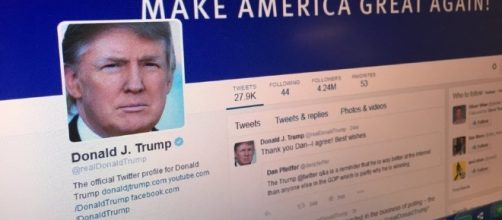This week, President Donald Trump came under fire for his Twitter activity, including blocking other users and tweeting about a pending case regarding his executive order for a a six-country travel ban. Although Trump has made headlines for his Twitter account in the past, some of his most recent activity has Twitter users questioning the constitutionality and legal implications of his online behavior.
Trump blocks critics
On Tuesday, the Knights First Amendment Institute at Columbia University wrote a letter to Trump asking him to unblock Twitter users who posted content which disagreed or otherwise critiqued his actions.
The use of the block feature on Twitter is typically used to prevent other users from interacting with them personally. For most users, the use of this feature is not considered a violation of the law or Twitter's user policies. However, on Tuesday, White House press secretary Sean Spicer confirmed at a press conference that tweets coming from Trump's Twitter account are also to be considered official White House statements. However, when users, particularly those in the US, are blocked from seeing such statements from public officials like Trump, it can lead to questions of transparency, which will inevitably lead to legal implications.
Furthermore, it is also likely that Trump's staff tweets for him.
In such a case, blocking users would generate little to no effect, besides prohibit individuals from voicing concerns to him as an elected official. The Knights First Amendment Institute also argued that such blocking interferes with First Amendment right because it obstructs freedom of speech in a "designated public forum."
However, it is yet to be determined by legislators whether social media is truly considered a public forum, further complicating the case.
Another argument made was that blocking users on Twitter would not violate the First Amendment, especially since the First Amendment concerns regarding Trump's tweets were directed at his personal Twitter account @realDonaldTrump, not his White House @POTUS account.
Tweeting about the travel ban
Also, this week, a tweet was posted on Trump's Twitter account regarding the petitioned Supreme Court case concerning the issue of his executive order for a six-country travel ban. The revised travel ban, originally including Iraq, now only includes Sudan, Libya, Iran, Yemen, Syria, and Somalia. Although Trump's legal counsel has advised him against referring to his executive order as a travel ban, Trump has continued to do so, as demonstrated by a tweet earlier this week.
People, the lawyers and the courts can call it whatever they want, but I am calling it what we need and what it is, a TRAVEL BAN!
— Donald J. Trump (@realDonaldTrump) June 5, 2017
That afternoon, the American Civil Liberties Union posted a tweet in response to Trump's post, stating that it might use his post against him in a Supreme Court argument.
Yes, we may incorporate @realDonaldTrump's tweets about the ban into our Supreme Court argument.
— ACLU National (@ACLU) June 5, 2017
Some legal experts predicted that the tweet could negatively impact his pending travel ban case. Others believed that Trump's tweets were not a legal issue.
"As a constitutional matter, as a legal matter, it should make absolutely no difference," said David B. Rivkin Jr., a lawyer for previous Republican administrations, to the New York Times.
The recent advent of Social Media Law would make this case an unprecedented challenge for the Supreme Court.


